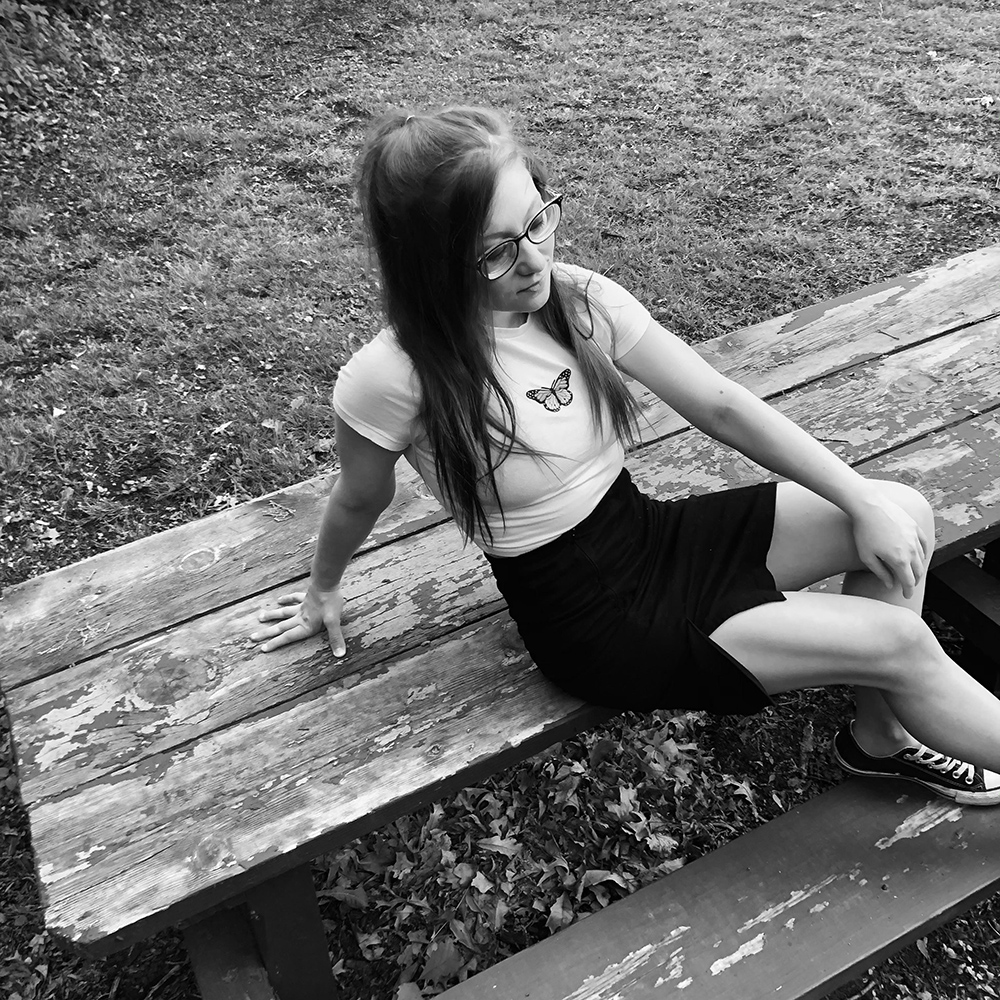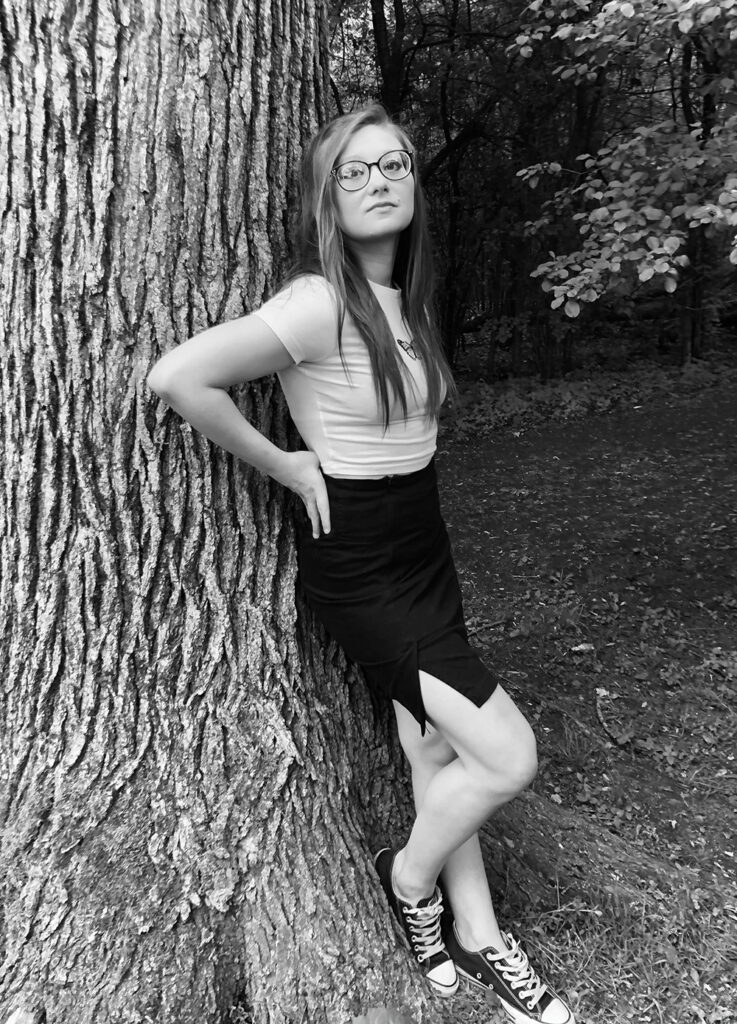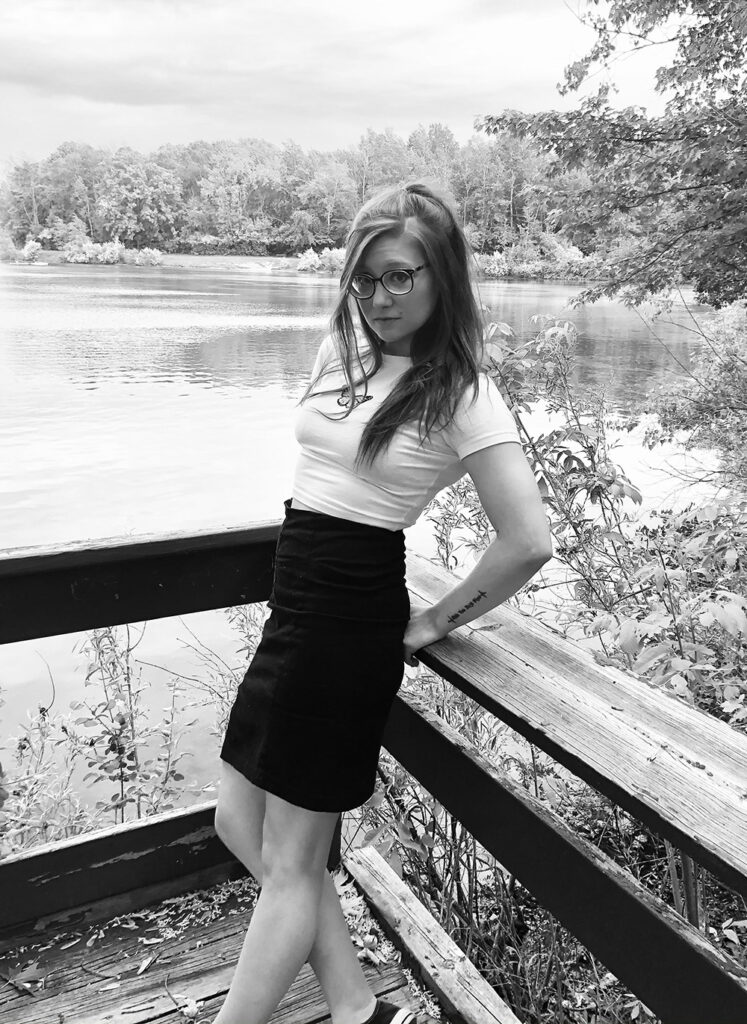Die deutsche Version findest du weiter unten.
Describing Kid Faye as an exceptional talent is probably best. Never before we have worked with an artist who was so determined and motivated. So we are pleased that Kid Faye has chosen White Rooms Records with her first release „What have you got“. She has a wonderfully special, often melancholy voice and also has highly musical talent; also her music is unusually experimental and is reminiscent of great artists such as Morcheeba or Portishead. Read the full interview with Kid Faye here.
Kid Faye, welcome to the Interview! Who are you? Tell us something about yourself!
Hello! I am Kid Faye / Hannah Irelan. Music has always been the center of my world, and I started writing when I was 11 years old with just a simple acoustic guitar and piano. I’ve had no lack of inspiration through very contrasting life experiences. Through it all, I’ve written meaningful songs that I sincerely hope others can enjoy as well as relate to or use as a means of working through their own hardships.
How did you get into music? And who or what inspired you to make music yourself? Do you admire other famous musicians or producers?
I’ve always had a passion for music; my dad was always very encouraging with my music/singing from a young age and both my parents were always playing classic/soft rock and folk music from the 60’s/70’s, which became the original influence for my personal musical style and preference. I’ve always been artistically inclined, so the idea of writing my own songs came naturally because I saw it as a way to express my thoughts/feelings/experiences through musically interesting ballads. I admire a lot of musicians who have a sort of lo-fi, chill soft indie-pop style like Still Woozy, Summer Salt, Katzu Oso, Clairo, Claud, Far Caspian and Yung Heazy.

Do you produce music as full-time job? Tell us about your everyday life. If not, what is your everyday life like? How can music production be integrated into your everyday life?
Music is definitely my full time job; when I’m not working on songs I’m spending time with and taking care of my family.
How would you describe the music you produce? Has your style changed before?
Emotionally driven ballads with dreamy vocals and vintage inspired synths. I tend to favor either the simple tenderness of a 60’s folk ballad or the very musically interesting and soulful chord progressions of traditional jazz. My style is always evolving…to an extent. Some elements of my style are always preferable to me; such as heartfelt/poetic lyrics, vintage sounding instruments, and the dissension of jazz chords in a song. Some elements have gone in ebbs and flows depending on what I’m listening to at the time; I’ve gone through more upbeat, pop-like phases and experimented like-wise with funk as well as using a contrasting trap/hip-hop beat incongruent to an otherwise indie-pop sounding song. Currently I’m really digging lo-fi music/beats and am working on some lovely lo-fi ballads.
Can you tell us what your creative process looks like? Which tools (software, hardware) do you use?
When writing a song, the base can come from a number of things; sometimes it starts with a melody or chord progression I find beautiful and musically interesting, sometimes it simply starts with a thought/experience/feeling I want to portray, and my favorite is when everything simultaneously comes to me at once; the chords, the melody, and the words/sentiment. I use Fruity Loops Studio, an Alesis keyboard, and sometimes an electric/acoustic guitar through audio interface.
What was your biggest success so far or is there a special moment in your music career that still makes you smile today?
I remember making my first c.d. back when I was 15 or 16… It was just a very basic production, nothing major, but was so special to me because it was a hard copy of my first collection of original songs. I still have it even though it now skips in some spots and there are some little mistakes in the recordings. I find although the songs are so full of cliche teenage angst, they’re still so pure and lovely.
Do you have a mantra Or was there any good advice that was given to you along the way?
At this point in time, I’ve come to make all my decisions based on the question „at the end of my life, will I regret the time/effort spent on this, or will I regret not giving my all?“ It has given me a clarity and a definitiveness in what I choose to do or not do that has taken all the stress out of decision making. It’s much easier to look at the mountain to climb ahead instead of picturing what it would feel like at the top, but at least for me, the idea of reaching the mountain top is more satisfying than staying in the valley and wondering „what-if“ or „if-only“.
Creativity has ups and downs. How do you deal with it? Are there phases in which you are particularly productive? And how do you motivate yourself? Do you have any tips for others?
The creative process definitely can have ebbs and flows, but the best way to work through it is simply to „work through it“. I don’t ever stop working on music, even if I’m hitting a little bit of a creative impasse; I simply expand on inspiration by listening to music I admire for different elements, and sometimes I’ll switch the instrument (software is wonderful, but oftentimes I find exploring progressions on a more tangible instrument via piano or guitar can really bring out resolutions/inspirations for songs a lot easier). The easiest tip for motivation/inspiration that I can offer is to write what you know. If you’re feeling lost/uninspired, then think of the first thing you’ve gone through/are going through that makes you feel a very intense emotion. Regardless if it’s a positive or negative emotion, when you have a real feeling driving you, not only will it set the tone for the chord progression and melody/lyrics, but it will also make much more of an impact to those listening. I’m a strong believer that people can feel the difference between a song that was made without real reason and a song that came from the soul.
What’s next for you?
I definitely am continuing to write and work on songs that are moving both musically and emotionally as well as learning more on how to translate those songs through the production quality. I’ve had years to write such beautiful pieces, yet comparatively speaking, not nearly as much time to learn how to translate those songs through the software/production element. I’m always learning and growing in that area, and there’s always more to learn.
Where to follow you and your work on social media?
Here’s my YouTube, Instagram, Soundcloud and Facebook:![]()
![]()
![]()
![]()
Thank you so much, Hannah for this great interview.
We wish you all the best and look forward to hearing more from you!

Hier findest du die deutsche Übersetzung des Interviews mit KID FAYE!
Kid Faye als Ausnahmetalent zu beschreiben, trifft es wohl am besten. Noch nie zuvor haben wir mit einem Künstler zusammen gearbeitet, der so zielstrebig und motiviert war. So freut es uns umso mehr, dass sich Kid Faye mit ihrem ersten Release „What have you got“ für White Rooms Records entschieden hat. Sie verfügt nicht nur über eine wunderbar besondere, oft melancholische Stimmfarbe und hochmusikalisches Talent; ihre Musik ist außerdem ungewöhnlich experimentell und erinnert an große Künstler wie Morcheeba oder Portishead. Lies hier das ganze Interview mit Kid Faye.
Kid Faye, willkommen zum Interview. Wer bist du? Erzähl uns etwas über dich!
Hallo! Ich bin Kid Faye, mit bürgerlichem Namen Hannah Irelan. Musik war schon immer der Mittelpunkt meines Lebens, und ich begann mit 11 Jahren mit nur einer einfachen Akustikgitarre und einem Klavier zu schreiben. An Inspiration hat es mir durch sehr gegensätzliche Lebenserfahrungen nicht gefehlt. Durch all das habe ich bedeutungsvolle Songs geschrieben, von denen ich aufrichtig hoffe, dass sie anderen Spaß machen und sich auf sie beziehen oder sie als Mittel nutzen können, um ihre eigenen Schwierigkeiten zu verarbeiten.
Wie bist du zur Musik gekommen? Und wer oder was hat dich inspiriert, selbst Musik zu machen? Bewunderst du andere berühmte Musiker oder Produzenten?
Ich hatte schon immer eine Leidenschaft für Musik; mein Vater war schon in jungen Jahren sehr ermutigend mit meiner Musik oder meinem Gesang und meine beiden Eltern spielten immer Klassik/Softrock und Volksmusik aus den 60er/70er Jahren, was der ursprüngliche Einfluss für meinen persönlichen Musikstil und meine Vorliebe wurde. Ich war schon immer künstlerisch veranlagt, daher kam die Idee, eigene Songs zu schreiben, auf natürliche Weise, weil ich darin eine Möglichkeit sah, meine Gedanken/Gefühle/Erfahrungen durch musikalisch interessante Balladen auszudrücken. Ich bewundere viele Musiker, die in der Stilrichtung Lo-Fi-, Chill-Soft-Indie-Pop unterwegs sind, wie beispielsweise Still Woozy, Summer Salt, Katzu Oso, Clairo, Claud, Far Caspian und Yung Heazy.
Machst du hauptberuflich Musik? Erzähl uns von deinem Alltag. Falls nicht, wie sieht dein Alltag aus? Wie lässt sich Musikproduktion in deinen Alltag integrieren?
Musik ist definitiv mein Vollzeitjob. Wenn ich nicht gerade an Songs arbeite, verbringe ich Zeit mit meiner Familie und kümmere mich um sie.
Wie würdest du die Musik beschreiben, die du produzierst? Hat sich dein Stil schon einmal verändert?
Emotional getriebene Balladen mit verträumtem Gesang und Vintage-inspirierten Synths. Ich bevorzuge entweder die schlichte Zärtlichkeit einer Folk-Ballade der 60er oder die musikalisch sehr interessanten und gefühlvollen Akkordfolgen des traditionellen Jazz. Mein Stil entwickelt sich ständig weiter… bis zu einem gewissen Grad. Einige Elemente meines Stils bevorzuge ich tatsächlich, wie herzliche/poetische Texte, altmodisch klingende Instrumente und die Uneinigkeit von Jazz-Akkorden in einem Song. Einige Elemente sind mal mehr, mal weniger vorhanden, je nachdem, was ich gerade höre. Ich habe optimistischere, pop-ähnliche Phasen durchgemacht und ebenso mit Funk experimentiert sowie einen kontrastierenden Trap/Hip-Hop-Beat verwendet, der nicht zu einem ansonsten Indie-Pop klingenden Song passt. Zur Zeit steh ich wirklich auf Lo-Fi-Musik/Beats und arbeite an einigen schönen Lo-Fi-Balladen.
Verrätst du uns, wie dein kreativer Prozessablauf aussieht? Welche Tools (Software, Hardware) nutzt du?
Beim Schreiben eines Songs kann die Basis aus einer Reihe von Dingen bestehen; manchmal beginnt es mit einer Melodie oder Akkordfolge, die ich schön und musikalisch interessant finde, und manchmal beginnt es einfach mit einem Gedanken/einer Erfahrung/einem Gefühl, das ich darstellen möchte, und am liebsten ist es, wenn mir alles gleichzeitig auf einmal einfällt; die Akkorde, die Melodie und die Worte/das Gefühl. Ich verwende Fruity Loops Studio, ein Alesis-Keyboard und manchmal eine elektrische/akustische Gitarre über ein Audio-Interface.

Was war dein größter Erfolg bislang oder gibt es einen besonderen Moment in deiner Musikkarriere, der dich heute immer noch zum Lächeln bringt?
Ich erinnere mich, dass ich meine erste CD gemacht habe. damals, als ich 15 oder 16 war… Es war nur eine sehr einfache Produktion, nichts Großes, aber für mich so besonders, weil es eine Hardcopy meiner ersten Sammlung von Originalsongs war. Ich habe es immer noch, auch wenn sie jetzt an einigen Stellen springt und es einige kleine Fehler in den Aufnahmen gibt. Ich finde, obwohl die Songs so voller Klischees von Teenagerängste sind, sind sie immer noch so rein und schön.
Hast du ein Mantra? Oder gab es mal einen besonders guten Ratschlag, der dir mit auf den Weg gegeben wurde?
Zu einem gewissen Zeitpunkt treffe ich alle meine Entscheidungen auf der Grundlage der Frage „Werde ich am Ende meines Lebens die dafür aufgewendete Zeit/Anstrengung bereuen oder werde ich es bereuen nicht alles gegeben zu haben?“ Diese Frage hat mir Klarheit und Entschlossenheit in dem, was ich tue oder nicht tue, gegeben, was dann den Stress bei der Entscheidungsfindung genommen hat. Es ist viel einfacher, auf den Berg zu schauen, um nach vorne zu klettern, anstatt sich vorzustellen, wie es sich oben anfühlen würde, aber zumindest für mich ist die Vorstellung, den Berggipfel zu erreichen, befriedigender, als im Tal zu bleiben und sich zu fragen, was wäre wenn? “ oder „nur wenn“.
Kreativität kennt Höhen und Tiefen. Wie gehst du damit um? Gibt es Phasen, in denen du besonders produktiv bist? Und wie motivierst du dich? Hast du Tipps für andere?
Der kreative Prozess kann definitiv Höhen und Tiefen haben, aber der beste Weg, ihn durchzuarbeiten, besteht darin, ihn einfach „durchzuarbeiten“. Ich höre nie auf, an Musik zu arbeiten, auch wenn ich in einer kreativen Sackgasse stecke. Ich erweitere die Inspiration einfach, indem ich Musik höre, die ich für verschiedene Elemente bewundere, und manchmal wechsle ich das Instrument. (Software ist wunderbar, aber oft finde ich, dass das Erforschen von Progressionen auf einem greifbareren Instrument über Klavier oder Gitarre wirklich Vorteile / Inspirationen hervorbringen kann und für Lieder viel einfacher ist) Der einfachste Tipp zur Motivation/Inspiration, den ich anbieten kann, ist zu schreiben, was du kennst. Wenn du dich verloren/uninspiriert fühlst, dann denk an das Erste, was du durchgemacht hast und was dir eine sehr intensive Emotion auslöst. Unabhängig davon, ob es sich um eine positive oder negative Emotion handelt, wenn du ein echtes Gefühl hast, das dich antreibt, wird es nicht nur den Ton für die Akkordfolge und die Melodie / den Text angeben, sondern auch viel mehr Einfluss auf die Zuhörer haben. Ich bin fest davon überzeugt, dass die Leute den Unterschied zwischen einem Lied, das ohne wirklichen Grund geschrieben wurde, und einem Lied, das aus der Seele kam, spüren können.
Was steht als nächstes bei dir an?
Ich schreibe und arbeite definitiv weiter an Songs, die sowohl musikalisch als auch emotional bewegen, und lerne mehr darüber, wie man diese Songs durch die Produktionsqualität übersetzt. Ich hatte Jahre, um so schöne Stücke zu schreiben, aber im Vergleich dazu nicht annähernd so viel Zeit, um zu lernen, wie man diese Songs durch das Software-/Produktionselement übersetzt. Ich lerne und wachse in diesem Bereich ständig, und es gibt immer noch mehr zu lernen.
Findet man dich auf Social Media? Wo können dir Interessierte folgen?
Hier kommen die Links zu meinen Profilen bei YouTube, Instagram, Soundcloud und Facebook.![]()
![]()
![]()
![]()
Dankeschön Hannah, für dieses tolle Interview.
Wir wünschen dir alles Gute und freuen uns mehr von dir zu hören!